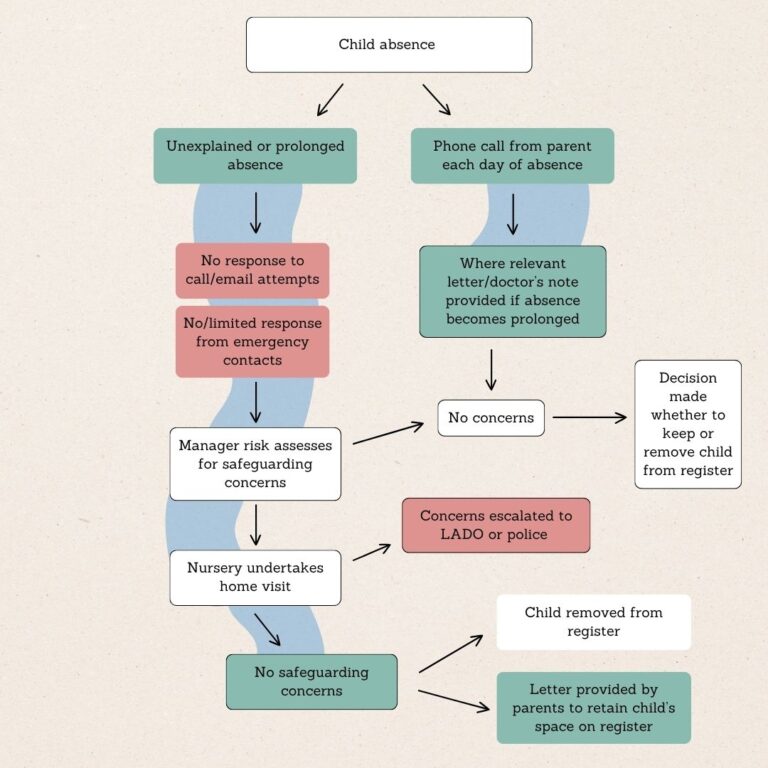Policy statement
Our role in providing expert care for children alongside their families means that we must maintain high levels of attendance, as research demonstrates a strong link between attendance and educational attainment.
Our policies use the term parents and carers for those who have parental responsibility, and the use of the plural does not assume that a child will always have two parents. We also recognise that in some circumstances the Local Authority or other individuals as deemed by the courts may have special guardianship of a child.
Your Responsibility Under This Policy
You must take time to read and understand the principles and expectations in this policy. If you don’t understand what is expected of you, you must seek clarification from your Nursery Manager.
Attendance during funded sessions
Parents/Carers have a duty to inform the nursery should their child be unable to attend for any reason. Particularly where funding is being claimed, we are obliged to monitor attendance and inform the Local Authority (Leicester City Council) if attendance falls below 90%. Kiddisafe is not obliged to provide alternative sessions where a child has been absent.
Failure to Make Contact
Parents who fail to provide us with notice of absence, or where the nursery has attempted to make contact with no response and the nursery becomes concerned, the following action will be taken:
- Attempts will be made to reach the provided emergency contacts.
- If no information is obtained, we will make a home visit to make sure all is well.
- In a case where we are unable to make contact with the family and we have no information on where the child or family are we will contact the police to investigate matters further.
To ensure the safety of the child and family, it is our duty of care to ensure the child/family’s safety is maintained.
Why good attendance is important
Good Habits
• It builds in young children the idea that getting up and going to nursery is simply what you do.
• Children who attend every planned session develop a feel for the rhythm of the week and gain a sense of security from some regular elements, even when the actual pattern or focus of their learning or activity may vary widely from week to week.
Secure Relationships
• Young children find it easier to build and sustain a range of social relationships when they regularly attend their childcare setting, according to the pattern agreed with the family.
• For some families, particularly at times of stress, the child’s regular attendance at nursery allows parents to get other things done and helps them enjoy spending time with the child when he or she is at home.
Self-Esteem
• Children who rarely miss sessions at nursery and attend on time are more likely to feel good about themselves. This is because they know what happens and what to expect, feel more confident with adults and the other children, and have more opportunities to be valued and praised for their own special contributions.
• Children who regularly miss sessions or are generally late, can frequently experience a sense of having to try a little bit harder just to understand what is going on and what other children are talking about or doing.
• Regular attendance, on time, helps many young children to separate from their parents or carers at the start of the day and settle more readily into daily life at nursery. Some children may need some flexibility when they first start attending to settle in but there should be a clear, time-bound plan in place to ensure the attendance patterns are normalised as soon as possible.
Learning and Development
• Practitioners carefully plan every session for each child in their care and want to take every opportunity to help them thrive; experiences gained in one session are often developed further in following sessions.
• Children learn in many different ways; through play with others and through being in the company of practitioners who actively support their learning and development.
• Underachievement is often linked to lower attendance. For some older students this is linked to a steadily deteriorating trend in attendance which is traceable right back to their first class in school or even their nursery setting.
For all these reasons, good attendance and coming to Kiddisafe on time is important for every child, but especially those for whom specific factors make them more vulnerable to disengagement or underachievement. Most children are well supported by their families and continue to thrive, whatever their background or circumstances, however, there may be factors in children’s lives which make it more likely that they could experience some difficulties. So, it is particularly important to pay close attention to the patterns of attendance for potentially vulnerable groups of children, including, for example:
• Children facing difficult family circumstances e.g., housing problems, bereavement, separation/ divorce;
• Children from families experiencing some degree of financial hardship, e.g., in receipt of benefits or claiming Free School Meals (FSM);
• Children with additional needs, learning difficulties or disabilities;
• Children with English as an Additional Language (EAL) or from Black and Minority Ethnic (BME) families; or disabilities.
• Children about whom other agencies have raised concerns, including those supported through Early Help.
If any child’s attendance starts to cause concern, it should be discussed with any other staff who work with any of the child’s siblings who attend the same nursery and with the manager. This helps establish whether there are issues only for an individual child or if the family as a whole may be going through a difficult time.
Promoting, monitoring and recording attendance
Monitoring attendance is important for all children, but especially for those who are most vulnerable.
When a child starts at the setting/school parents/carers should be informed of the importance of regular attendance and explain how the setting will monitor and steps they will take if there are any attendance concerns.
• Knowing when children have attended school or pre-school provides vital information to keep children safe from harm and help tackle underachievement.
• Having clear accessible attendance records helps identify children at risk and helps multi-agency teams to understand, assess and support the widest possible range of needs for a child and his or her whole family.
• To ensure that attendance records support the work of safeguarding young children and promote their learning and development, it is important for senior managers and staff at all levels to pay attention to the following:
• Keep full registration details for every child, as specified in the EYFS or school attendance
legislation.
• Keep accurate information about parents, carers and others who may accompany the child to
and from school or pre-school.
• Make clear and accurate entries, whether you are using manual or electronic registers.
• Consistently and thoroughly investigate all absences for individual children and their siblings
and keep good records of the family’s explanations.
• Put in place some routine monitoring of attendance by governors, committees or the owner.
• Put in place systematic and rigorous monitoring of the registers by senior leaders who are personally involved in ensuring accurate recording, identifying and addressing attendance issues and engaging parents.
• Being rigorous in monitoring attendance and in identifying and analysing patterns of absence (often called ‘broken weeks’) and the number of sessions missed;
• Being rigorous and persistent in seeking and recording explanations for absence, however sensitively this is done;
• Develop good relationships with the family making sure that appropriate means of communication to meet family needs are used at all times;
• Making sure (through induction and regular reminders) that all staff know what to do, and who to tell, if:
– a child is absent/late;
– a child has a changeable or deteriorating pattern of absence or lateness; or
– a child goes missing
• Making sure that the school or setting knows where to turn to for advice or support or whom
to alert if concerns arise.
Taking action

